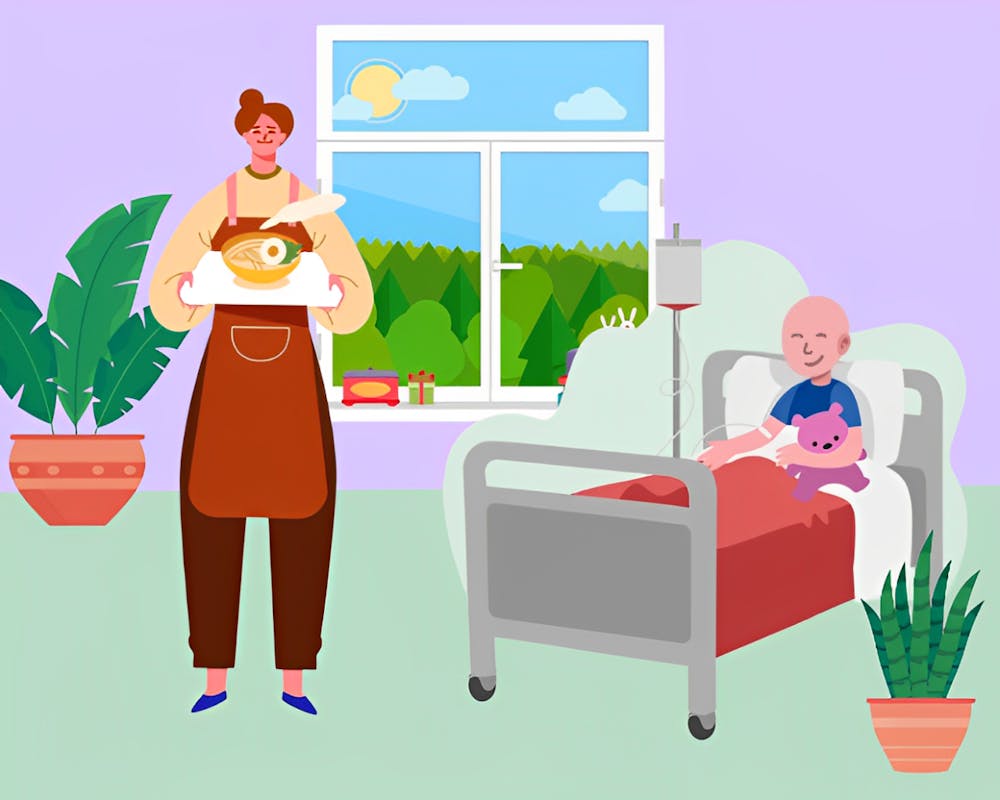As many undergraduates face difficulties obtaining sought-after volunteer positions at U.Va. Health, students concerned about accessing medical service opportunities have taken matters into their own hands. In January, four students founded the Clean Plate Project, a student-led organization in which members cook meals for the families of patients at U.Va. Children’s Hospital. Unlike medical service programs that require certification or training, the CPP asks that students only demonstrate a willingness to help provide comfort to dozens of families at U.Va. Health.
Every Saturday at 10 a.m., members of the CPP prepare a lunch for the patrons of the Ronald McDonald House Charities Charlottesville, a temporary residence for families of pediatric patients receiving long-term medical care. In the RMH kitchen, students review the recipe of the day, prepare ingredients, then slice, chop and sear until the meal is ready. At noon, students serve the food to families passing through the house or pack the meals in the RMH kitchen to be enjoyed later.
Kunaal Agarwal, president of the CPP and fourth-year College student, combined a love for cooking and a desire to connect with people when he founded the CPP with three other students. For him, making a meal for someone else is about more than physical nourishment — it is an act of service that can brighten the days of patients and their relatives.
“Throughout my life, I’ve been cooking for myself, and in college, I found that it's a great way to bring people together and form deeper relationships,” Agarwal said. “I realized that I can use food and cooking — and the power of a nice meal — to provide the family of the patients comfort.”
Within the first year the CPP has been running, Agarwal said CPP members have already bonded with several patrons of the RMH. As families may stay at the RMH for months at a time, students have the chance to connect with them regularly. Agarwal recalled how one family — whose child had been hospitalized with leukemia for the past four and a half months — expressed their gratitude for CPP members’ cooking and presence.
“They hadn’t had a good bowl of pasta in the entire time they’d been there, and we made lasagna that day,” Agarwal said. “I just remember them telling me how much this reminded them of home, Sunday dinners and grandma’s cooking.”
For the families staying at the RMH, the CPP’s work is more than just a meal. It is a reminder of the comfort of home, something they may not have the luxury to experience while their child is in the hospital. Bridgette Butynski, RMH outreach and events senior manager, said the CPP offers families a brief moment of respite from the stress and uncertainty of life at the hospital by taking just one worry — the question of where they will get their next meal — off their plates.
“We're very thankful, and we're very blessed to have [CPP] because it alleviates a stressor for our families.” Butynski said. “They can come back from the hospital and have a home-cooked meal.”
Besides providing comfort through meals, Agarwal said one of the foundational goals of the CPP was to expand health-related opportunities for students. Agarawal said he noticed that most students only engage with U.Va. Health through shadowing or volunteering in the hospital, and he wanted to find a different way to connect students with patients.
“There was a slight gap in the diversity of available clinical experiences at U.Va.,” Agarwal said. “I thought people would be interested in an alternative to traditional volunteering at a hospital.”
As the CPP neither caps its membership nor requires any specialized training, the organization differs from other undergraduate medical service programs at the University. Ramsey Beladia, founding member of the CPP and fourth-year College student, explained how organizations such as Madison House limit the number of undergraduates who may participate in their medical services programs, leaving students feeling excluded from health opportunities on Grounds.
Additionally, Beladia said undergraduates must often jump through several hoops — including an application, interview, background check and training period — to volunteer at U.Va. Health. Other medical opportunities, such as Emergency Medical Technicians and Certified Nursing Assistants, also require certification and extensive training. In light of these requirements, Beladia said the CPP founders wanted to create a space for students to get involved in U.Va. Health without obtaining additional certification.
“We thought there must be more avenues to serve medically at U.Va. … without certification,” Beladia said. “We wanted to find another way to serve these families.”
After applying to become a Contracted Independent Organization this semester, the CPP is currently awaiting official approval from Student Council. In the meantime, CPP members continue to bring comfort to families through meals and fill gaps in health-related opportunities for students. Agarwal said they plan to extend their services to cook for pediatric patients of U.Va. Children’s Hospital in addition to their families. Butynski commended students for their commitment to forging their own path of service at U.Va. Health.
“The students are in awe of the families’ strength, and the families are in awe of these students who are young and willing to give up their time and give back to the community,” Butynski said.







